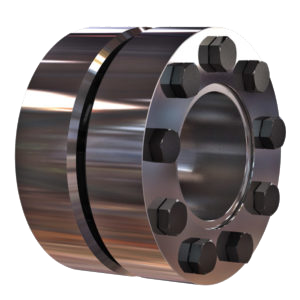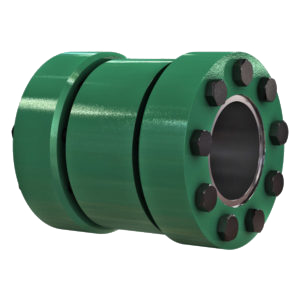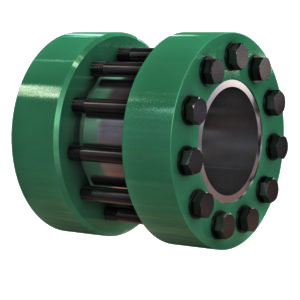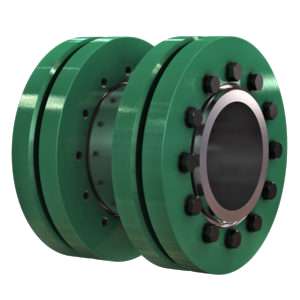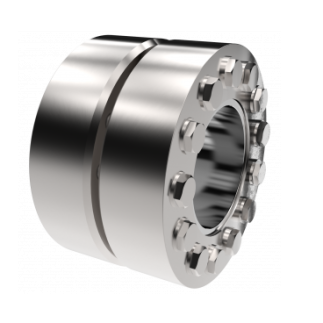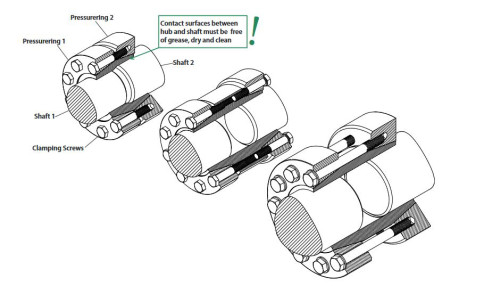Shaft couplings
The main function of the rigid shaft coupling is the safe and backlash-free connection of two shafts by means of friction. For example between a drive shaft and driven shaft and
mainly to transmit torque. Shaft couplings consist of a connecting sleeve and two external clamping systems.
They are not separable like flange coupling. The external clamping systems generate a backlash-free connection by pressing the connecting sleeve onto the shaft ends. The external clamping system does not transmit any torque or moments between the shaft ends, they just provide the necessary clamping forces. Those external clamping systems are not part of the flow of forces, but the connecting sleeve is.
Downloads
 Shaft couplings(3022 KB)
Shaft couplings(3022 KB)
Due to the frictional connection of the two shaft ends, torques, bending moments and axial forces can be transmitted safely. A significant advantage of shaft couplings is their compact design. Compared to other shaft couplings, this is designed to be significantly smaller.
The benefits
- Compact Design
- Rigid and clearance-free connection of shaft ends
- Transmittable torque from 80 Nm to 1.513.000 Nm
- Shaft diameter from 10 mm to 420 mm
- Individual special solutions are possible
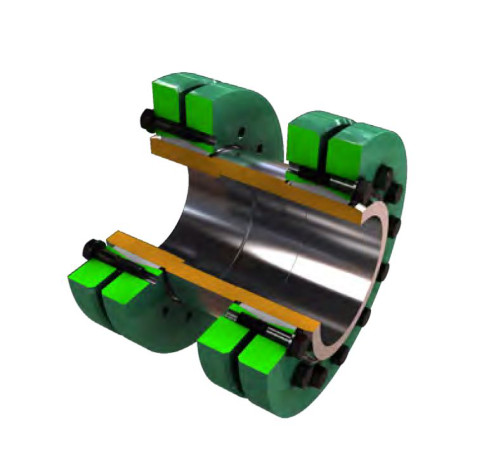
Product overview
The most compact design is the shaft coupling of the "W" series. This is
available as standard for shaft diameters from 10 mm to 270 mm. Special
diameters such as inch dimensions can also be implemented without
problems.
Furthermore, we also manufacture our shaft couplings with improved
corrosion protection and special surface finishes. If shaft ends with a
larger shaft distance are to be connected to each other, the shaft
couplings of the "WLA", "WLB" and "WK" series are suitable for this
purpose. The connecting sleeves of these shaft couplings are specially
designed for larger shaft distances and can be adapted to any customer
requirement if necessary.
Assembly
Compared to flexible shaft couplings, the drive or gear side of a rigid shaft coupling must be elastically supported. Due to its type of connection, the rigid shaft coupling is not able to compensate any shaft misalignment. This means that the shafts must be precisely aligned with each other before assembly. Any shocks, deformations or vibrations that occur are to be compensated by another elastically mounted part of the drive train.
The couplings have to be installed by moving them onto the shaft ends followed by tightening of the external clamping systems via bolting. To achieve proper operation and a
sufficiently high coefficient of friction, the contact surfaces at the shaft extensions must be free of grease, dry and clean.
Our rigid shaft couplings are supplied ready for installation. The functional surfaces of the external clamping systems, threads and head rests of the screws are provided with lubricant at the factory.
Application examples
The shaft couplings are used, for example, in the marine industry, materials handling technology, mixing and process technology and in the entire drive technology where a safe and backlash-free connection of two shaft ends is required.
© Copyright Lütgert & Co. GmbH | Friedrichsdorfer Straße 48 | 33335 Gütersloh (Germany) | Phone: +49 52 41 / 74 07 0 info@luetgert-antriebe.de | Sitemap | Legal Notice | Privacy policy | Privacy policy E-mails
© Copyright Lütgert & Co. GmbH
Friedrichsdorfer Straße 48
33335 Gütersloh
Germany
Phone: +49 52 41 / 74 07 0
info@luetgert-antriebe.de
Sitemap
Legal Notice
Privacy policy
Privacy policy E-mails




